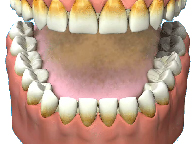 Smoking makes your gum disease much worse than if you didn’t smoke – by a significant amount.
Smoking makes your gum disease much worse than if you didn’t smoke – by a significant amount.
Due to the reduced oxygen and harmful smoke and gases which saturate your mouth for long periods in the day, the bacteria colony present in your mouth are changed and your gums will be more damaged by worse bacteria.
When people give up smoking it is common to see a dramatic improvement in their oral health and their gum disease is much improved. You are also much more likely to suffer cancer of the mouth (and other areas) if you smoke.
We encourage smoking cessation advice for patients interested in giving up smoking.
FAQs about Smoking
How can smoking affect my oral health?
 Most people are now aware that smoking is bad for our health. It can cause many different medical problems and, in some cases, fatal diseases. However, many people don’t realise the damage that smoking does to their mouth, gums and teeth.
Most people are now aware that smoking is bad for our health. It can cause many different medical problems and, in some cases, fatal diseases. However, many people don’t realise the damage that smoking does to their mouth, gums and teeth.
Smoking can lead to tooth staining, gum disease, tooth loss and in more severe cases mouth cancer.
Why are my teeth stained?
 One of the effects of smoking is staining on the teeth due to the nicotine and tar content. It can make the teeth yellow in a very short time, and heavy smokers often complain that their teeth are almost brown after years of smoking.
One of the effects of smoking is staining on the teeth due to the nicotine and tar content. It can make the teeth yellow in a very short time, and heavy smokers often complain that their teeth are almost brown after years of smoking.
How will smoking affect my gums and teeth?
Smoking can also lead to gum disease. Patients who smoke have a different bacterial balance in their mouths, which leads to gum disease. The gums are affected because smoking causes a lack of oxygen in the bloodstream, so the infected gums fail to heal. Smoking causes people to have gum disease to progress more rapidly than in non-smokers. Gum disease still remains the most common cause of tooth loss in adults.
How is smoking linked with cancer?
Most people know that smoking can cause lung and throat cancer, but many people are still unaware that it is one of the main causes of mouth cancer too. Every year thousands of people die from mouth cancer brought on by smoking.
What about mouthwashes?
People who smoke may find they are more likely to have bad breath than non-smokers. Fresh breath products such as mouthwashes may help to disguise the problem in the short term, but will only mask it.
How often should I visit my dentist?
It is important that you visit your dentist regularly both for a check up which will include a full mouth examination so that any other conditions can be spotted early. You should visit your dentist at least once a year. However, this may be more often if your dentist feels it necessary. People who smoke are more likely to have stained teeth, and therefore may need appointments more often.
What can my dentist do for me?
Your dentist will carry out a regular examination to make sure that your teeth and gums and whole mouth are healthy. Your dentist will also examine your cheeks, tongue and throat for any signs of other conditions that may need more investigation. They may also be able to put you in touch with organisations and self- help groups who will have the latest information to help you stop smoking.
Will I need any extra treatment?
Your dentist may find that you need treatment for gum disease, which will involve several sessions of deep scaling and thorough cleaning and keep a close check on your oral hygiene.






